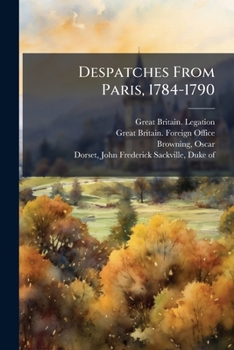Despatches From Paris, 1784-1790
Select Format
Select Condition 
Book Overview
Despatches From Paris, 1784-1790 offers a unique window into a pivotal period in European history through the eyes of British diplomats stationed in Paris. This collection, meticulously compiled from the archives of the British Legation and Foreign Office, provides firsthand accounts of the events leading up to the French Revolution. The despatches, penned by figures such as the Duke of Dorset, capture the political, social, and economic climate of pre-revolutionary France, offering invaluable insights into the growing unrest and the eventual collapse of the ancien r gime.
Edited and introduced by Oscar Browning, this volume presents a detailed narrative of diplomatic exchanges, court intrigues, and the day-to-day observations of British officials navigating the complex world of 18th-century Parisian society. These primary source documents shed light on the evolving relationship between Britain and France, and the early warning signs of the revolutionary storm that would soon engulf Europe. A crucial resource for historians and anyone interested in the French Revolution, Despatches From Paris provides an intimate and authoritative perspective on a transformative era.
This work has been selected by scholars as being culturally important, and is part of the knowledge base of civilization as we know it. This work was reproduced from the original artifact, and remains as true to the original work as possible. Therefore, you will see the original copyright references, library stamps (as most of these works have been housed in our most important libraries around the world), and other notations in the work.
This work is in the public domain in the United States of America, and possibly other nations. Within the United States, you may freely copy and distribute this work, as no entity (individual or corporate) has a copyright on the body of the work.
As a reproduction of a historical artifact, this work may contain missing or blurred pages, poor pictures, errant marks, etc. Scholars believe, and we concur, that this work is important enough to be preserved, reproduced, and made generally available to the public. We appreciate your support of the preservation process, and thank you for being an important part of keeping this knowledge alive and relevant.





